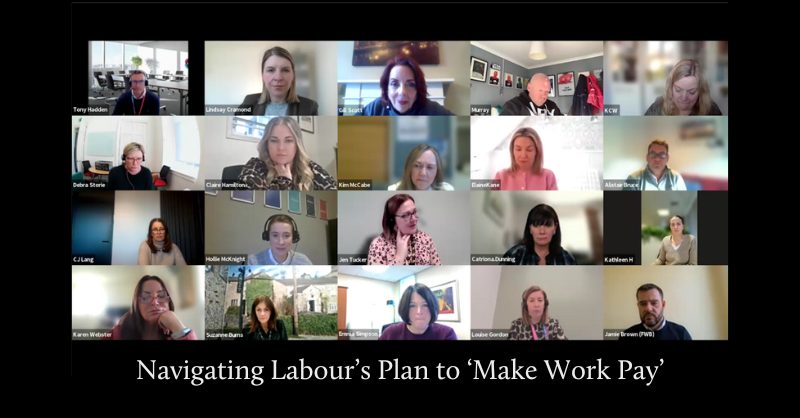Contact the team at FWB to discuss your individual or company requirements, or to discover more about our specialist services.
From Private Sector to Purpose: Navigating the Move into Scotland’s Public or Charity Sectors
8 May 2025
- Thought Leadership

Over the past few years, there has been a noticeable increase in the number of Executives approaching FWB to initiate a conversation about making their next move into the public or charity sector. They have usually spent years, sometimes decades, in the corporate world when something inspires them to consider changing sector and applying their skills and experience in a purpose-driven environment.
Senior professionals are reevaluating their careers. Some are looking for a “second act” with purpose; others are motivated by a desire to give back to their communities or use their skills in more values-driven contexts. Post-pandemic introspection, climate awareness, and generational expectations have all played a part.

Scotland’s Third and Public Sectors: A Shared Landscape of Impact
Scotland’s third and public sectors together form a vital part of the country’s social and economic fabric. Both are also under increasing pressure.
The third sector includes over 45,000 organisations, including charities; community groups; social enterprises; and voluntary associations, employs more than 135,000 people and contributes over £6 billion to the economy. From large national to hyper-local projects tackling food insecurity or social isolation, the sector is diverse, mission-driven, and deeply rooted in communities.
The public sector, meanwhile, remains one of Scotland’s largest employers, with over half a million people working across health, education, local government, emergency services, and other national bodies. It plays a central role in delivering essential services and shaping policy around wellbeing, equity, and sustainability.
From health and social care partnerships to community wealth-building initiatives and climate action, collaboration between public institutions and third sector organisations is becoming more integrated and strategic.
What Private Sector Leaders Can Offer
Common challenges across the sectors include the pressure on public funding, rising operational costs, issues with recruitment and retention, increasing and changing service demand, global uncertainty, and increased scrutiny. In response to these, there is often the requirement for leaders who are entrepreneurial, commercially minded and financially astute. This can often lead Boards and CEOs to consider people making the move from the private sector because these leaders often bring:
- Strategic clarity and financial discipline
- Change management and restructuring expertise
- Digital transformation capabilities
- Experience in scaling operations or fundraising
We at FWB have seen some brilliant transitions from former CEOs now leading major charities, finance directors stepping into COO roles, marketing specialists revitalising donor engagement or HR Directors transforming a workforce. The ones who succeed do so with humility and commitment to the cause, not just their career.

Common Pitfalls (and How to Avoid Them)
Moving into the third sector without preparation can backfire. Here are a few common missteps and how to avoid them:
- Assuming it’s “simpler”
In reality, it requires nuanced leadership, stakeholder empathy, and agility. You will almost certainly be operating in a resource-constrained environment and if you are looking for an “easier life” then you might be surprised!
- Saviour mindset
Charities need partners, not rescuers. Respect the lived experience and expertise already within the organisation.
- Failure to adapt language and behaviours
Translate your experience into sector-relevant outcomes. “Increasing EBITDA” becomes “improving long-term sustainability.” Understanding that KPIs will be different, and you may have to completely reevaluate how you motivate your team and recruit and retain talent.
- Pace of change
Things may not happen as fast as you would like them to. Good governance in these sectors is crucial and decision-making and transformation can require some extra steps.

Making the Move: Practical Advice
If you’re seriously considering a move into the charity sector in Scotland, here’s what we recommend:
Volunteer first
Join a board or advisory panel. Many charities and public sector bodies actively seek trustees or non-executive board members with finance, legal, HR, digital, or broader commercial skills. These roles can get you exposure to the relevant governance arrangements, culture, regulatory landscape, and stakeholder environment.
Do your homework
Read up on the organisation’s impact reports, values, and funding model. Understand the difference between grant-funded and self-generating models.
Tailor your CV and write a cover letter
Emphasise the transferable skills relevant to the role that you are interested in. Articulate the “why?” clearly: Why this role? Why this cause? If working with an Executive Search professional, then take up the offer of someone reviewing your application and giving feedback.

How FWB can support your journey
At the intersection of sectors, our role is more than matchmaking. We advise on cultural fit, support candidate readiness, and help boards think boldly about leadership potential.
We’ve placed private sector leaders into CEO, Director, and Trustee roles across Scottish charities, social enterprises, non-departmental public bodies, the NHS, universities, central government and more. When done well, these transitions unlock extraordinary impact and provide leaders with uniquely fulfilling career opportunities.
We are experienced in moving senior executives across sectors can help you position yourself authentically and connect you with the right roles.
The public and charity sectors in Scotland need bold, skilled, mission-aligned leaders.
If you’re looking for a second chapter that’s as fulfilling as it is challenging and want to contribute to some of the most important work being done in our communities, now is the time to start that conversation.





